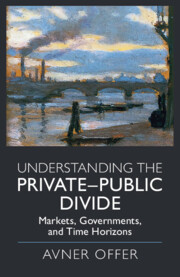Book contents
- Understanding the Private–Public Divide
- Understanding the Private–Public Divide
- Copyright page
- Dedication
- Contents
- Figures
- Tables
- Preface
- Abbreviations
- Introduction
- Chapter 1 Patient Capital
- Chapter 2 Corruption and Integrity
- Chapter 3 Plutocratic Blowback
- Chapter 4 Creating Humans
- Chapter 5 Exit from Work
- Chapter 6 Housing and Democracy
- Chapter 7 Climate Change and Time Horizons
- Conclusion
- References
- Index
Chapter 4 - Creating Humans
Published online by Cambridge University Press: 14 April 2022
- Understanding the Private–Public Divide
- Understanding the Private–Public Divide
- Copyright page
- Dedication
- Contents
- Figures
- Tables
- Preface
- Abbreviations
- Introduction
- Chapter 1 Patient Capital
- Chapter 2 Corruption and Integrity
- Chapter 3 Plutocratic Blowback
- Chapter 4 Creating Humans
- Chapter 5 Exit from Work
- Chapter 6 Housing and Democracy
- Chapter 7 Climate Change and Time Horizons
- Conclusion
- References
- Index
Summary
In economics the labour force comes out of nowhere. Under capitalism children are still produced at home. Under slavery they were reared for profit. Children were reared collectively in kibbutzim and boarding schools. In industrialising Britain child labour paid for itself. Affluent societies rely on communal education. Even private schools are not-for-profit. The slogan of school choice was invented for racial segregation. Its appeal is social separation. For politicians and wealthy backers the charter school/free school/academy model is ideological money-laundering and opportunities for enrichment. Despite three decades of effort school choice has failed. Universities derive their economic support from student fees financed by government loans. This encourages expensive facilities, at the expense of students and staff. Student loans have become a lifelong burden exacerbating inequality. Bringing children to maturity relies on family altruism and public education. Other methods have failed.
Keywords
- Type
- Chapter
- Information
- Understanding the Private–Public DivideMarkets, Governments, and Time Horizons, pp. 78 - 87Publisher: Cambridge University PressPrint publication year: 2022

